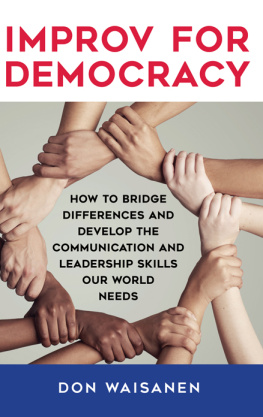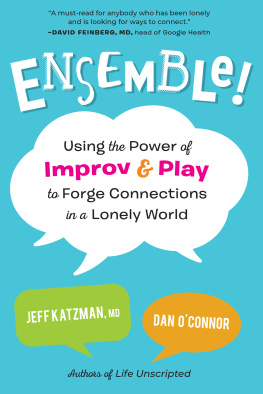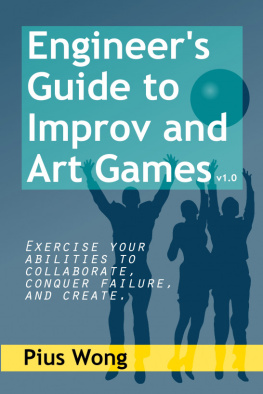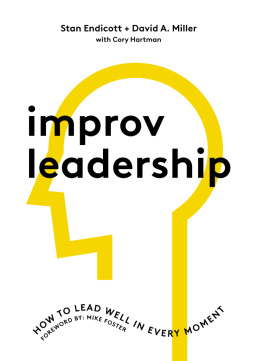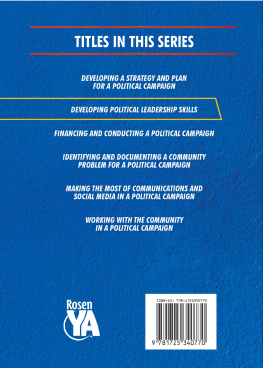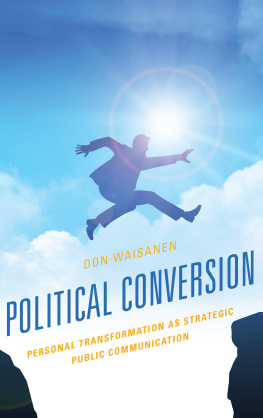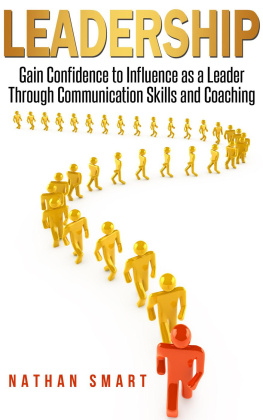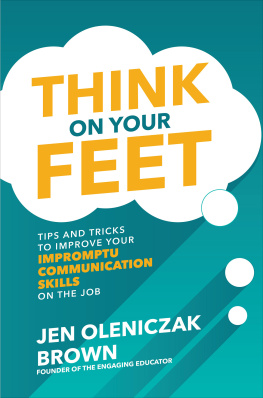IMPROV FOR
DEMOCRACY
SUNY series in New Political Science
Bradley J. Macdonald, editor
IMPROV FOR
DEMOCRACY
HOW TO BRIDGE DIFFERENCES AND
DEVELOP THE COMMUNICATION AND
LEADERSHIP SKILLS OUR WORLD NEEDS
DON WAISANEN
This project was supported by a research sabbatical from the City University of New York
Published by State University of New York Press, Albany
2020 State University of New York
All rights reserved
Printed in the United States of America
No part of this book may be used or reproduced in any manner whatsoever
without written permission. No part of this book may be stored in a retrieval system or transmitted in any form or by any means including electronic, electrostatic, magnetic tape, mechanical, photocopying, recording, or otherwise without the prior permission in writing of the publisher.
For information, contact State University of New York Press, Albany, NY
www.sunypress.edu
Library of Congress Cataloging-in-Publication Data
Name: Waisanen, Don, author.
Title: Improv for democracy : how to bridge differences and develop the communication and leadership skills our world needs / Don Waisanen.
Description: Albany : State University of New York Press, [2020] | Series: SUNY series in new political science | Includes bibliographical references and index.
Identifiers: LCCN 2020015262 | ISBN 9781438481159 (hardcover : alk. paper) | ISBN 9781438481173 (ebook)
Subjects: LCSH: CitizenshipStudy and teaching. | DemocracyStudy and teaching. | PlaysImprovisation.
Classification: LCC LC1091 .W345 2020 | DDC 372.89dc23
LC record available at https://lccn.loc.gov/2020015262
10 9 8 7 6 5 4 3 2 1
Contents
Acknowledgments
This project came into being through others generosity. Id like to thank David Hoffman, Michael Phillips-Anderson, Deborah Dunn, and Greg Spencer for their early feedback on chapter drafts, and my impeccable research assistants Prabin Ranamagar and Shana Kieran-Kaufman. Im grateful to Cindy Thompson and Raquel Benbunan-Fich for believing that having students up on their feet and playing with one another could make a significant contribution to an executive MBA curriculum. The same thanks go to Jerry Mitchell and Patria de Lancer Julnes, for allowing me the space to run Improv for Democracy as a course with our public administration students. To Dean David Birdsell, his incredible staff, and all of my colleagues and students at the Baruch College, CUNY Marxe School of Public and International Affairs, I owe immense gratitude for the ways that you have supported and inspired my scholarship over the last decade. Id also like to thank Becky Heino and Beth Yoshida-Fisher at Columbia Universitys School of Professional Studies, Kim Pearce and friends at the CMM Institute for Personal and Social Evolution, Marian Rich, Carrie Lobman, and many others at the East Side Institute, Michael Seltzer and Gaurav Bawa at the New York Community Trust Leadership Fellows program, and Todd Kelshaw at Montclair State University for providing me with other platforms for this work. My thinking has also been greatly informed by partnerships with many individuals and organizations working in the public interest, especially the Kettering Foundation. From the improv comedy world, Id like to thank Gary Kramer for years of being able to perform with the National Comedy Theater and run WITS Teambuilding sessions. Without Jill Shely, Glenn Packman, Drew Tarvin, Amelia Fowler, Mike Gregorek, Jason Scott Quinn, and so many others, I wouldnt have had the honor of performing and working with the incredible cast of Comedysportz New York City. To everyone in the Applied Improvisation Network, thank you for the years youve labored to make this work matter around the world (and a second shout out here to the fearless Marian Rich for co-leading AIN-NYC with me and being a continual source of encouragement on this project). To my parents, thanks for your unconditional support and love, every day Im trying to pay it forward. Last, all my love goes to my spouse, Lauren, and sons, Joel, Sam, and Levi, who every day teach me how to best improvise into the future.
Introduction
The Upward Call
In a small city in the Netherlands, the tensions between police and Dutch-Moroccan youth had reached a crisis point. After a young man robbed a bus driver, officers and youth began clashing on the streets. One young person, Ilias, expressed his anger toward the cops for arresting him several times, beating him violently, and throwing him into some thorn trees. On the other hand, with so many kids standing on street corners engaging in suspicious behaviors or hurling insults, the police felt they were simply doing their jobs. Fueled by media stories about rising crime, the conflict spiraled out into the community when local restaurants began refusing service to the young people. Throughout the city, shouting, hatred, and distrust filled the air. Like so many places in the world, this had become a normal part of life.
For close to a year facilitators tried to bring the two groups together. As part of the intervention, they asked the police and youth to play improvisational games with one another. With much skepticism and little interest in the process, the young people told one another it would be useless to engage with the police. One participant even said that for the first few meetings he wouldnt shake hands with anyone in law enforcement because of how violently he had been treated. From the opposite end, one officer shared how the idea of playing games with the young people originally sounded ridiculous to his squad.
But then something extraordinary happened. After engaging in these exercises, the officers and young people began to move beyond their rigid positions and see the humanity in one another. In one activity, the facilitators asked the police and youth to switch roles for a day, improvising what it might be like to step into the others shoes. The young people donned police uniforms and traveled through the city on bikes, while the cops acted out the youth standing on street corners and giving the officers a hard time. The shouting and anger turned into laughter and empathy. Both sides enjoyed the activity immensely, and the stage was set for real, solutions-focused conversations.
After these experiences, Marieke Borg, a police officer in the city, shared how she would now greet young men on the street, a previously unthinkable behavior. One young man related that the two groups became one, and they understood each other better. Another officer shared, I have been released of my negativity. The negative feeling I had toward these boys. In fact, the projects first year was so successful that the youth and police continued into a second. Jaap Norda, a researcher analyzing the intervention, noted how such changes begin at a small scale. an atomic reaction starts between two molecules, but the explosion has an enormous effect.
Over twenty years ago, I went to see a live, professional improv comedy performance for the first time. I was stunned by how the performers worked with and trusted one another. They exhibited a level of play and joy seldom seen in everyday life, constantly built on one anothers lines and actions rather than negating them, and overall, practiced fearless, seemingly superhuman communication skills. After, I decided to take an improv class, and I have never looked back. Little did I know that what basically started as a fun hobby would go on to have so much application to the rest of life. When I look back at what fields have most informed my thinking, improvisation remains at the core. Beyond its personal and professional benefits, however, the applications of improvisation hold the potential to transform our organizations and societies in ways previously unimagined. As the police and young people in the Netherlands discovered, improvising well matters.

